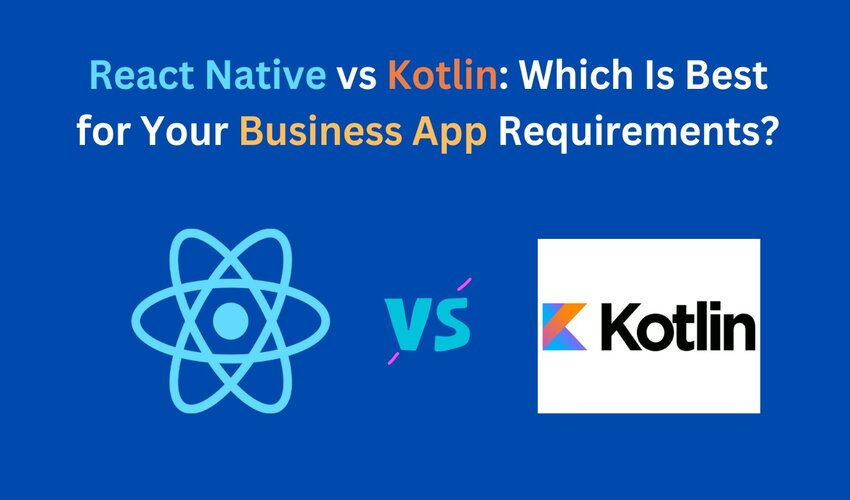React Native vs Kotlin: Which Is Best for Your Business App Requirements?
In general, React Native & Kotlin are the best choices for cross-platform or multi-platform app development. But among them, which is best for your business app requirements? Go through this guide and explore the features, pros & cons, real-life brand examples, use cases, and differences between both React Native & Kotlin.
Business app requirements or multi-platform development revolves around software applications that can work much better in multiple digital habitats. The capability can typically be pursued to sell software for multiple operating systems, such as Apple and Microsoft.
Due to that, the popularity of cross-platform development has increased. It lets developers work on a single codebase that can run on different platforms effectively. It eradicates repetitive tasks from various development cycles and boosts the speed of the complete process.
Hence, multi-platform development is cost-effective & lets the app reach an audience across various platforms. Specific fundamental strategies for the business app requirements include compiling multiple versions of similar programs for different OS.
The React native app development company can use API to adjust the kind of software to a particular platform. There is a particular limitation that cross-platform development can make the application somewhat inefficient.
For instance, it may need unnecessary file storage folders or processes to support many systems. But, professional developers have clearly understood that this is the minimal price for the various advantages of multi-platform development.
More multi-platform app development frameworks & tools have begun to increase rapidly in the market since this concept became popular. As a result, now the developers have more options to use for multi-platform development.
It can be overwhelming when you need clarification about choosing the best option. React Native or Kotlin are the best multi-platform development frameworks suitable for various business app requirements. Read this guide further and understand the concept better.
What is React Native?
React Native is the JavaScript-based framework that can be effectively utilized to build native-like iOS and Android applications. It has become the best choice for business app requirements in recent years. The codebase of React Native can be used for desktops and web apps.
Features of React Native:
There is a wide range of reasons why React Native is best for business app requirements – it is highly scalable and easy to use. Check out below to explore the features:
- UI-focused
React Native provides more importance to designing the app user interface. It can deliver better rendering capability since it is highly responsive.
- JavaScript advantages
You can effectively find developers to work on React Native due to its close association with JavaScript. Further, it will expand the talent pool while looking for a helping hand to develop the React Native app.
- Write once and use it anywhere
Through React Native, you can write a codebase only once and use similar native code for various platforms, be it iOS, Windows, or Android. Hence it is the most effective option for business app requirements.
Pros of React Native:
It is free, community-driven, and open-source. The pros of React Native are mentioned below:
- Support for third-party plug-in
- Outstanding performance
- Hot reloading
- Independent modules
- Cost-effective feature expansion
Cons of React Native:
There are also some cons of React Native that you must consider:
- Native language comprehension
- Commitment issues
- Licensing & patent issues
- Loosely-typed language
- The framework is not mature enough
Use cases of React Native:
React Native can effectively create an app that needs heavy lifting. It is not that suitable for resource-intensive apps. Facebook designed React Native to replace HTML5 to deliver outstanding mobile application experiences. From that time, it has become the best option to work in the background of client devices and make JavaScript a practical language for professional developers.
Real-life examples of React Native
Bloomberg, Walmart, UberEats, Gyroscope, Facebook Ads Manager, and Instagram are some popular brands using the framework for certain React native app development services.
What is Kotlin?
Kotlin is the programming language. But in 2020, JetBrains rolled out an open-source and free Kotlin Multi-Platform that lets developers use single codebases to build apps for iOS and Android.
The statically-typed framework generates the codebase that runs on various Java virtual machines. The name of this programming language originates from Kotlin Island, near St. Petersburg, Russia. Kotlin can easily interoperate with Java even though the language’s syntax is incompatible.
Features of Kotlin:
Kotlin is the best option for various multi-platform app platforms. Android has a better setup to translate the Java codes into Kotlin. The codebases of Kotlin can work effectively on Java Virtual Machine. Check out below to explore its features:
- Null point exception elimination
Kotlin focuses on removing blunderous Android SDK. Application crashes while developers forget the assignment or use the incorrect spelling
- Runtime overhead minimization
The extensions from the Java library can be effectively included in Kotlin. Most of the tasks will be in a sequence that reduces the runtime expenses effectively.
- Extension functions
Kotlin enables professional developers to include various methods in the classes without changing anything in the source code. Users can easily adjust the pre-existing roles to certain default classes and enhance their functionalities.
Pros of Kotlin:
Kotlin is a compact programming language that permanently increases the application’s efficiency. Can perform more work within fewer lines of code in a short time. The pros of Kotlin are mentioned below:
- Existing Java code compilation
- Easily maintainable
- Less problematic
- Modular integration
Cons of Kotlin
There are also some cons of Kotlin that you must consider:
- Fluctuating compilation speed
- Fewer Kotlin professionals for hire
- Not the Java replacement
Use cases of Kotlin:
One can use Kotlin for various Android app developments with the official support of Google. Developing multiple project management tools, social media platforms, and eCommerce sites is very handy.
Real-life examples of Kotlin:
Trello, Pinterest, Airbnb, Corda, Zomato, and Basecamp are famous brands using the framework for specific practical Kotlin app development projects.
React Native vs. Kotlin: What is the difference?
If you are looking for the best language for business app requirements, then sure React Native tops the chart. At the same time, the recent launch of Kotlin Multiplatform has supported cross-platform development completely for iOS and Android and can be equipped with various modern features. But there are some significant differences between these two frameworks.
Have A Look At The Below To Know Its Difference And Comparative Analysis:
- Performance levels
React Native provides a native-like experience by enabling the developers to create apps using native modules and JavaScript. React Native is growing fast and provides a native feel and look on Android and iOS platforms.
Kotlin allows developers to write platform-specific codebases smoothly and share the business logic effectively written in the programming language. The applications of Kotlin can be fast but not much compared to React Native apps.
- Development experience
React Native enables developers with effective features like ready-to-use components, native development capabilities, and hot reloading. Professionally experienced developers can leverage JavaScript easily beside the native user interface to develop iOS and Android apps using a similar codebase.
Kotlin lets developers use the multi-platform logic again and write the platform-specific codebase when it is essential and making the development cycle hassle-free and faster.
- Cost and time
You don’t need to exceed the budget and time while developing apps for your business app requirements. React Native can be ideal when there is a budget constraint. It is best to build prototyping and MVPs.
Similar to React Native, Kotlin is also free and can be helpful to build fast applications with fewer resources. It can be best when you don’t have enough time. It will take only less time to write a code.
- Learning curve
In spite of using powerful libraries and JavaScript, React Native has a sudden learning curve. Professional developers skilled in JavaScript don’t have any problems while using React Native for business app requirements.
Due to the potential and wide adoption of React Native, finding professional developers with the essential skill set is very simple. Kotlin has a shallow learning curve since it can be completely interoperable with Java, and various web developers find it simple to use and learn.
Final verdict: React Native or Kotlin?
From the above-mentioned scenario, now you have explored the features, pros & cons, real-life brand examples, use cases, and differences between both React Native & Kotlin. Both can efficiently and successfully be useful for various business app requirements. But according to your project requirements, you can choose the most suitable one.
Whether you prefer to hire React native developers or choose Kotlin, choosing the right option can help you turn around the application cost-efficiently and faster. You can get the help of the leading developers and also get their suggestions.
Professional experts are pioneers in business app requirements and have worked on various multiple projects. The technology and skills of these experts can surely help you a lot.
Author Bio:
Jatin Savaliya has been working with Best Remote Team an India-based offshore mobile app development company. He is a technology enthusiast and writes content to provide readers with insights about various technologies and related trends.
















Leave a Reply